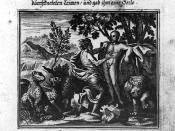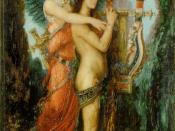Anwar Garvin
Ancient Myth - Paper 1
Theogony was published in 700 BC, Metamorphoses 8 AD and in this relatively short period of time, pious people significantly decreased the phantasmagoria surrounding God(s). It is remarkable that even though the pioneers of modern cosmology had not appeared until the 16th century, Ovid, inadvertently, by believing that God(s) showed a direct, beneficial Providence, prophesied the modern idea of the origin of the universe. Theogony and Metamorphoses include similar themes however Hesiod uses Hesiodic pessimism and Ovid uses Ovidian Optimism. Distinct examples of the difference in central philosophy are the idea Chaos, the virtue of gods, and the plot of each story.
Hesiod says that the beginning of the universe started with Chaos (Hes. Theog. 116). Chaos remains and never goes anywhere. In the last mentioning of Chaos, "â¦the Titans dwell, past the gloom of Chaos." (Hes. Theog. 820) No evidence of Chaos ever disappearing exists.
Since this universe begins and ends with Chaos, it is the place from which all the gods and other creatures in this story come.
Beautiful in form and mellifluously speaking, the Muses tell Hesiod that they "know how to tell many believable lies," (Hes. Theog. 28) It is worth nothing, then, that their extensive account of the gods could all be a lie. The Muses start their chant off with a pejorative remark calling certain people "hillbillies" (Hes. Theog. 27). Their statement emphasizes that humans are not hallowed like gods and gods do not respect humans. Anthropomorphism is pervasive in Hesiod's account of creation which is used provocatively that takes away from the gods' divinity when the earth has sex countless times (Hes. Theog. 132-136).
Hesiod's circular plot expresses the horror of the gods and emphasize that this will only...


